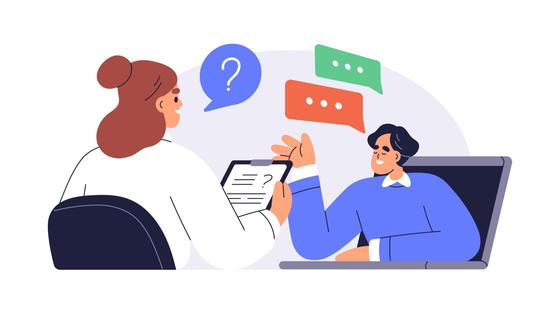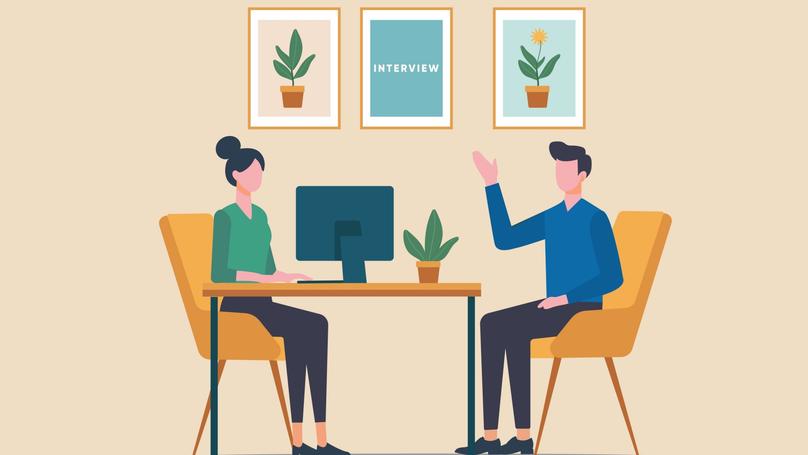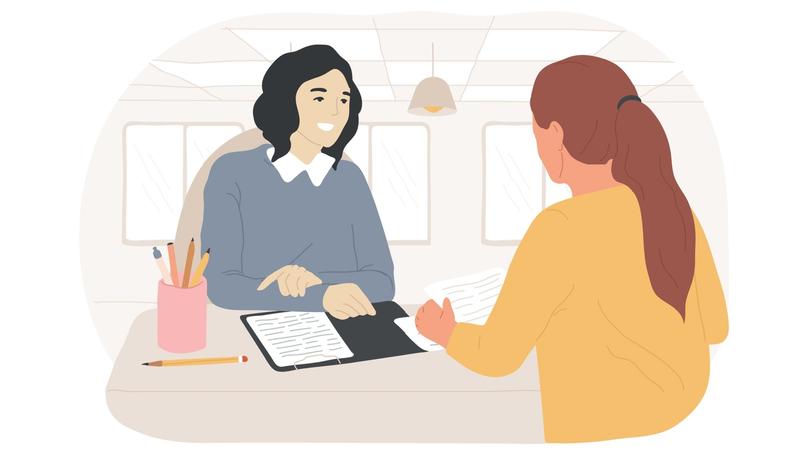“We’ll get back to you.” What to do if you hear this in a job interview
If you were to survey the world's population to find out which hiring-related phrase they hate the most, we are sure it would be “We’ll get back to you.”

Everyone who has had to deal with job hunting and job interviews has heard it at least once in their life. Indeed, there is nothing worse than hearing these words instead of a direct refusal, because they give an illusion of hope. But does "We'll get back to you" always mean rejection? Why don't they tell you "You are not the right person for us" directly? And is there any way to never hear this phrase again?
What's really behind the phrase "We'll get back to you"?

According to the same surveys, only 20% of jobseekers actually wait to be called back, while the rest immediately start looking for another open position and continue going to interviews (at the same time, women, as well as respondents under 40 years old, hope to be called back more often than men). Meanwhile, in a similar survey, but among HR managers, 56% do call candidates back after a decision has been made, and in case of a negative decision too (unless other conditions for a call have been agreed upon, for example, getting back only in case of a positive answer).
Therefore, the phrase "We'll get back to you" does not always mean refusal, but at the same time, such a possibility cannot be ruled out. The good news is that, according to statistics, this phrase is used less frequently today than it was 5-7 years ago. Large companies now usually use email messages to notify you of a negative response. So you may hear the phrase 'We'll get back to you' not only when they want to say no, but also in the following cases:
-
The person making the final decision is currently on holiday or busy;
-
HR managers want to get to know other applicants, even if they are happy with you;
-
HR specialists need time to match your application with the current needs of the company. Sometimes companies have to reject even seemingly perfect candidates, simply because they are looking for a more narrowly focused specialist or can't afford to pay for your services (so even top talent can be turned down, don't despair!).
If you really didn't get a call back, and you objectively don't understand why, because you are sure that you are the right person for the job, here are a few possible reasons for the lack of a long-awaited call:
-
The HR or manager has not yet had time to make a decision. This is most often the case if the position is highly important and the approval procedure takes place in several stages with many people involved.
-
The HR is still screening and comparing candidates, meaning the vetting process is still underway.
-
Human error - the HR simply forgot about the promise to call you back.
-
The manager is checking you for your interest in the company and expects you to call back on your own (yes, such infamous checks do happen).
-
You are actually too good or expensive for the company at the moment (although in this case, they may still contact you later and agree to consider you later if more suitable vacancies arise).
Of course, "We will get back to you" can indeed mean rejection. You can recognise that this is the case by the following signs during the interview that preceded this phrase:
-
The interview did not last more than 15 minutes (this may indicate a lack of interest in your application).
-
You were hardly asked any questions (whereas a large number of questions is a good sign, indicating that they want to get to know you better).
-
You were told very little about the company and the hiring process, you were the one doing all the talking (although this could also be indicative of HR's plain incompetence).
-
You were frequently interrupted and prevented from finishing telling a story about yourself or your cases.
-
You were not introduced to anyone, and you are not even sure you know the names of the people who attended the interview.
Unfortunately, if you experience at least 2-3 of these signs, there's a good chance you won't actually get a call back, and that phrase was a veiled rejection that HR resorts to when they don't want to take the time to explain. Or due to inexperience or company policy, they feel uncomfortable telling applicants head-on that they are not a good fit.
Lectera’s Online Courses by topic
How to ensure that "We'll get back to you" is never said at the end of an interview again

We have prepared for you some tips that will help you to react correctly to the phrase "We'll get back to you." Moreover, you will know how to ensure that this phrase never bothers you or doesn't come up at all during your interviews.
Inquire about the candidate's requirements during the interview
It is worth preparing for "We will get back to you" and preventing this phrase already in the course of the interview itself. So, ask HR directly what criteria they use to select candidates and what qualities, experience requirements, education or other parameters they consider mandatory and paramount. With this information, you will be able to objectively assess how suitable you are for the job, and you will definitely get the actual call back.
Also ask how many stages the interview is made up of, if there are any stages that you have not yet passed. If there are, and you are told "We will get back to you", then obviously you are not qualified for the other stages. In short, ask as many clarifying questions about the position and the hiring process as you can. Firstly, this will show your interest in the company. And secondly, it will help you understand what kind of decision you can expect, what the company really needs, what your chances are, etc.
Specify terms and conditions for the call
Take immediate preventive action if you hear someone say, "We'll get back to you." Don't wait! Ask how long it will take to make a final decision and by what date you should expect a call. This way you will set a sort of "deadline" for the recruiter and at the same time check whether they are really going to call you back, because if the answer is vague ("Oh, it is up to the manager…" or "I don't know"), it is likely a rejection. So factor a week or more into your wait.
In addition, you can agree on the conditions under which HR will call you back. For example, specify that they will call you only in case of a positive answer or, on the contrary, ask them to call you in any case to inform you directly about a refusal, too, because it is extremely important for you.
Keep considering alternatives
Even if you are sure that you will get a call back, don't stop looking. Firstly, you do not yet owe anything to this company, you have not yet made any agreements and can not be fully sure of their subsequent hire (as you know, time is money, especially when you find yourself unemployed). Secondly, during this time, while you wait for their call, you can look for better options and you will simply have something to occupy yourself with so that you do not hang on waiting.
Keep going to interviews and repeating all these steps and tips against the phrase 'We'll get back to you' until you actually get a call back or get hired right away. And when that happens, be prepared - read the next paragraph for this one!
Make up your mind
The waiting period for a call back is a time when not only the employer makes a decision, but you do too. As mentioned above, thanks to this "We'll get back to you" phrase, you have the opportunity to consider your best options, assess your capabilities, needs and wants, and flesh out your expectations of the company whose call you are waiting for. Be prepared to give a precise answer if (when) you get a call back: the timeframe you're willing to go into work, whether you agree to all the terms, and whether you've thought about any other details you may not have clarified the first time and agreed to discuss later. Do not be vague with "I'll tell you later" or "I'll call you back when I know", otherwise you risk pushing away an interested employer. After all, you've had plenty of time to make up your mind, right?
Once the agreed-upon waiting period has passed, call them back yourself
If you have been given an approximate date to expect a call but have not heard back, wait a few more days, a week at the most. Bear in mind the human factor and the potential strain on HR or the employer, but don't delay in making your own call. The more time that has passed since the interview, the less likely it is that the company will even remember who you are. Don't be afraid to call back! Even if you feel like the promise to call back was really a rejection. It's always better to ask again if you're not sure than to be tormented by doubts. At the very least, you can send the recruiter an email or social media message reminding them of the promised call and wait for a response there.
Prepare for the call
If you are going to call back yourself, before you dial the number or even just write a message, prepare all the information that HR may ask you for. This is especially critical if the company is large and HR is not up-to-date on all interviews and candidates. Be prepared to give your name, the date of your last interview, the job title, the department and (ideally) the name of the person who interviewed you.
There's no doubt that the phrase 'We'll get back to you' is among the top hated phrases of all jobseekers, and while it does sound frustrating, there's actually nothing wrong with it. In fact, you can use the time taken by the company for contemplation to your advantage! For example, compare offers from several employers and make sure you're interested in that particular company. And if you still don't get a call back or interpret the lack of a call as a rejection, don't despair. As they say, those who do nothing are the only ones who have never failed. The most reliable way to make it through an interview for a desired position is to go to it with the most relevant skill set and be prepared for different types of interviews, which you will learn how to pass in Lectera's "Finding Your Dream Job" course!
Share this with your friends via:
Latest News

A significant stage in the development of the alternative education system has begun in West Northamptonshire in the UK: the County Council is actively calling on parents, guardians, and trustees to participate in shaping the future of this key area.

Outwoods Primary School in Atherstone, Warwickshire, having experienced deep sadness after the loss of their famous cat, Silla, has found solace in a new pet – a Maine Coon named Aloysius O’Hara.

In modern universities, artificial intelligence, and in particular ChatGPT, is rapidly transforming from a controversial tool into a full-fledged student assistant.

An innovative educational project is gaining momentum in UK primary schools, aiming to change attitudes towards video games.

The Massachusetts Institute of Technology (MIT) presents MIT Learn – a revolutionary online platform that opens a “new front door” to access university knowledge and resources.












 Test. Check Your Social Media Dependency Level!
Test. Check Your Social Media Dependency Level!
 Test: What Business is Right For You?
Test: What Business is Right For You?
 “I’m Here for the Long Haul”: When Loyalty to a Company Becomes Toxic
“I’m Here for the Long Haul”: When Loyalty to a Company Becomes Toxic
 Test: How Prone Are You to Abusive Behavior as a Manager?
Test: How Prone Are You to Abusive Behavior as a Manager?
 Test. What superpower would you possess if you were a superhero?
Test. What superpower would you possess if you were a superhero?
 Test. What Should You Let Go of Before Winter Ends?
Test. What Should You Let Go of Before Winter Ends?
